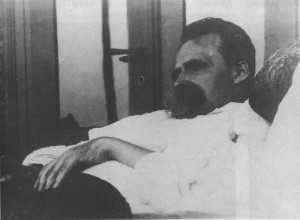Change of Ideals and Influence
While working in Basel as the chair of classical philology (mixture of literary criticism, linguistics, and history), he became close friends with Richard Wagner. Each of their works were influenced by each other and together they convinced to the government to fund the building of a new theater in which Wagner’s new masterpiece, The Ring of the Nibelung, was to be performed for the Emperor. After hearing Wagner’s new masterpiece, Nietzsche unfortunately discovered that he hated the new work. Now, Nietzsche began to question Wagner’s ideas as well as Prussian culture in general. During this time, Nietzsche was battling with many internal struggles. Although it was not known until later in life, Nietzsche had been suffering from insomnia and had been writing out his own prescriptions and signing them “Dr. Nietzsche” (More Similarities of 2 Nietzsche biographies, 2012). The medication he was taking caused hallucinations and most people at the time thought the hallucinations could somehow be related to the brain illness that his father died from when Nietzsche was younger.
Soon after his fallout with Wagner, Nietzsche discovered the French Enlightenment and Wagner and Nietzsche’s time of friendship and collaboration was completely over. The French Enlightenment was associated with anti-Church and anti-government radicalism (Gill, 2012). Many people had blindly followed the government and church for a long time. It wasn’t until the French Enlightenment that people began to question these governing bodies and their actions. People began asking question and seeking out their own answers. Knowledge and learning was self-directed. Although Nietzsche had originally went to school to be in the clergy, his opposition to the Church and government continue to grow. The French Enlightenment helped Nietzsche focus his ideas into what was truly revolutionary at the time

Friedrich Nietzsche
by Olde, Hans, used under ![]()
Nietzsche’s most influential work, The Will to Power was based on a series of notes in his journals and contains strong oppositions to idealism. This anti-idealist stance not only had an influence on thinkers such as Bataille, but continued to shape the thought of existentialists, post-modernists and post-structuralists well into the 20th century (Friedrich Nietzsche Biography, 2012). Idealists and Nietzsche had vastly different points of view. Compared to Nietzsche, idealists such as Immanuel Kant believe “the assertion that we can never be certain whether all of our putative outer experience is not mere imagining” (Moore, 1903). Nietzsche’s ideas were revolutionary at the time because he was one of the first people to express their opposition to idealism. Nietzsche has even be quoted saying “no price is too high to pay for the privilege of owning yourself” (Friedrich Nietzsche Biography, 2012). Nietzsche believed that a person owns their ideas and beliefs and there is no need for outside validation. This idea provided a dynamic change because some people no longer looked to others for validation and began to own their actions which was revolutionary idea at the time.
When he returned to Basel after taking another leave to help in the military, he was yet again in ill-health and only managed to teach from 1869-1879 before retiring. Nietzsche suffered from a mental breakdown upon witnessing a coachman cruelly whip his horse. After that incidence, he was put in an asylum and then ultimately placed in the care of his family. Upon his death, his sister Elisabeth was given the rights to publish any unpublished material of his which caused issues because she was married to a prominent member of the German anti-Semite movement which Nietzsche hated (More Similarities of 2 Nietzsche biographies, 2012). Although this caused a conflict of interest, all of Nietzsche works were eventually published. Although his entire life had been plagued with brain illnesses similar to his fathers which caused some people to question his judgment, Nietzsche’s works did influence many great people to come such as Andre Malraux, Jean Paul Sartre, and Sigmund Freud.
Sources:
Friedrich Nietzsche Biography. (2012, January). Retrieved from European Graduate School- Graduate and Postgraduate Studies: http://www.egs.edu/library/friedrich-nietzsche/biography/
Gill, N. (2012). Educational philosophy in the French Enlightenment. From nature to second nature. International Journal of the History of Education, 1-4.
Moore, G. (1903). Kant’s Idealism. Proceedings of the Aristotelian Society, 127-140.
More Similarities Between 2 Biographies of Nietzsche. (2012). The Chronicle of Higher Education, 40-58.
Olde, Hans. (c. 1899). Friedrich Nietzsche. [Digital Image]. Retrieved from http://commons.wikimedia.org/wiki/File:Nietzsche_Olde_11.JPG. Public domain image.
